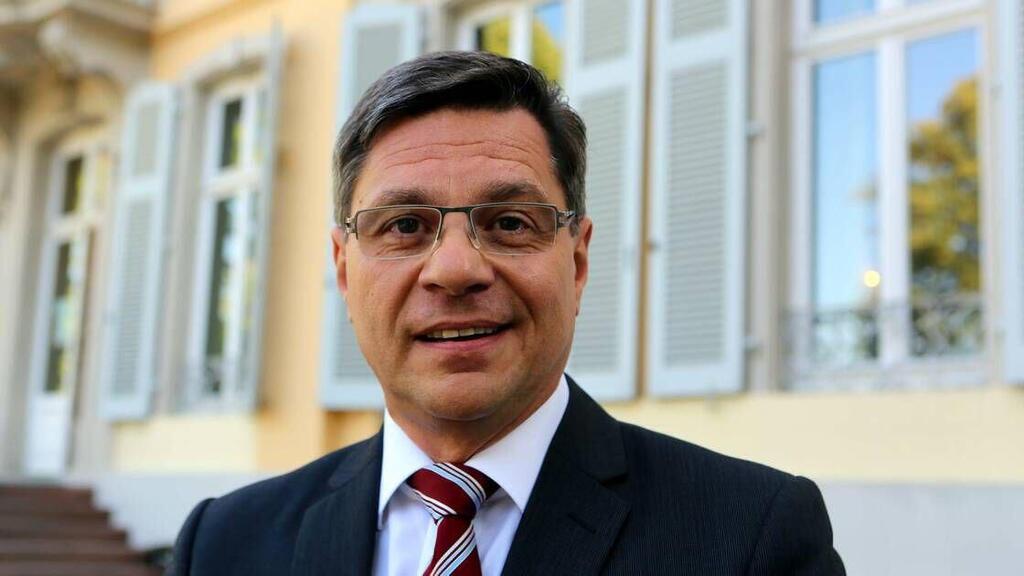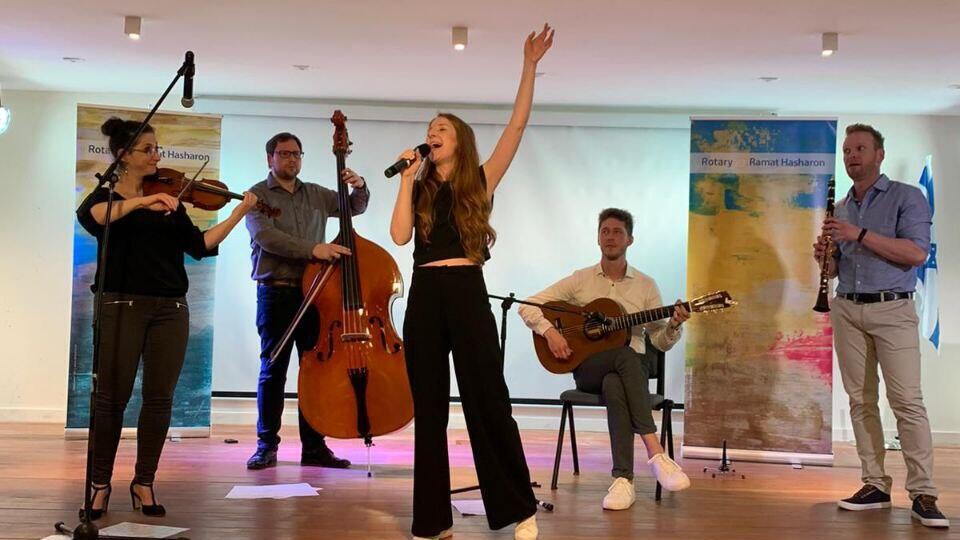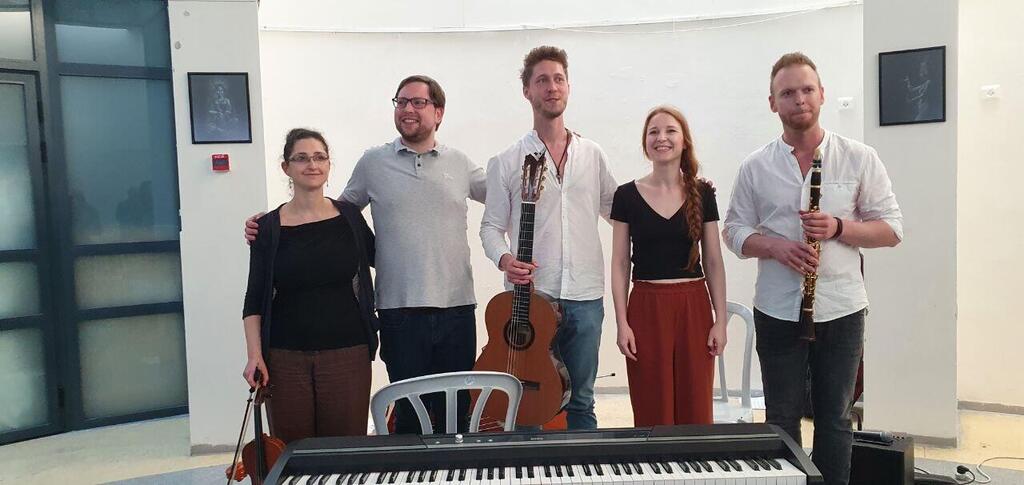Getting your Trinity Audio player ready...
Crazy Freilach - Katonti
(Video: Sarit Ruff)
Five super-talented musicians from Leverkusen, Germany, play traditional Jewish music at nursing homes and in front of Holocaust survivors in Israel and in Germany, and they are called Crazy Freilach (crazy laugh, in German).
Other stories:
These five musicians have been dedicated to Klezmer continually for two decades now. With great enthusiasm, they commit themselves to Klezmer music and Yiddish songs, with the purpose of keeping this fantastic heritage of Eastern European Jews alive.
"There is too much hate in the world," says 29-year-old Julian Hilgert. "With this music, playing this music in front of students, and in front of Holocaust survivors - we have a message; we have a duty to play this music, to sing the songs which almost got forgotten during the Holocaust because the Nazis tried to destroy all of it.
We have a responsibility to remember, to talk, to prevent something like that from ever happening again."
I met them a few days ago in Israel, within the framework of their concert tour, and listened to their wonderful, spiritual-like music playing. They sang songs in Hebrew, Yiddish, and Jewish traditional music (Hassidic).
Today in Leverkusen there is already a 6th generation of young non-Jewish Germans playing Klezmer music and Jewish songs
Crazy Freilach was founded in 2006. The ensemble has its origins in a thirty-year-old tradition of Klezmer musicians from the Leverkusen City Music School, initiated by its director Mr. Jürgen Ohrem. Ohrem fell in love with Klezmer music in the early 90s, after having met Giora Feidmann, a clarinet player and one of the most famous Klezmer musicians in the world.
Ohrem asked Feidmann to come teach his young non-Jewish German students Klezmer music, realizing that this could be the most effective vehicle to further his life's goal of building a bridge between Jews and Germans through music.
From that moment on, a tradition was born, and in 1992 the first Ensemble from Leverkusen came to Israel, playing Klezmer music for Holocaust survivors as well as for the general public, alongside Israeli musicians and choirs. In 2000, "Jeanne Rabin's Ensemble" was one of the first choirs that Jürgen Ohrem invited to come to Leverkusen as guests of the Music School, to perform for German audiences side by side with the Klezmer groups, to meet German choirs, to make personal connections which eventually turned into lifelong friendships.
Why specifically Jewish Klezmer music?
Emma Fridman (42): For me especially, it's the music of my childhood, the music of my grandparents, that I heard at a very early age, through this music I re-unite with my roots. Also, this music school, this music, gives us hope.
Jeannine Engelen (34): Making and singing this music combines singing and acting and it involves much emotion; it's music that goes straight to the heart, and when the band is playing solo, without me singing, I fall in love with it again.
Who is your audience?
Engelen: we only played in Germany and in Israel. We are looking forward to playing also somewhere else, in other countries. We met a woman who's living in London who said she was going to invite us to perform there. We just got started. Most of the time, in Germany, we're performing in front of Elderly people who listen to Klezmer Music.
Jewish or non-Jewish audience?
Engelen: Non-Jewish. Because there aren't many Jews in Leverkusen. We have a small Jewish community; the biggest Jewish community is in Düsseldorf, but they are not coming to our concerts. And in Israel, the audience is a mix.
"Over the years, Jürgen Ohrem and the Klezmer Ensembles from the music school played in front of more than 3,000 survivors of the Holocaust"
Hilgert: I want to go back to the question before, of why it's important for us to play especially this music, and then to answer the question in front of whom we play. The first time I got to Israel I was 17. I played Klezmer music; I drove to Israel, and I had no idea what it was going to be like. At the age of 17 you don't really deal with politics and stuff, but those experiences I had here, were unusual. Over the years, Jürgen Ohrem and the Klezmer Ensembles from the music school played in front of more than 3,000 survivors of the Holocaust. All of us, don't really have a connection with the Holocaust.
But still, there is too much hate in the world and with this music, with those trips to Israel, and to answer your second question - playing this music in front of students, discussing with students what it's about, why we're doing that, playing in front of also Holocaust survivors, even though sadly, not many of them are alive; but still, we have a message, we feel like we have a duty to play this music, to sing the songs which almost got forgotten during the Holocaust because the Nazis tried to destroy all of Jewish life during that time.
"For some Holocaust survivors, our music is a closure in a way. If we can spread some hope for them, that's our goal"
We've had 10 concerts in Israel right now, and I remember one concert which was very special to me: two days ago we performed at a friend's house whom I met 14 years ago in Israel. Her uncle invited us to play at his place for his family and neighbors, we arrived there and noticed that 5 or 6 of them (aged 50-60) spoke German. why did they speak German? Because their parents grew up in Germany; their parents, in some cases, survived the Holocaust, in some cases died during the Holocaust; and for us, when you get to talk to the people and when you see in their eyes what you make them feel, for some of them, as they told us, it's a closure in some way. If we can with our music, if we can spread some hope for those people who lived through the Holocaust and for the parents who lived through that, that's our goal.
Is this your way of making amends for the past? Ask for forgiveness from your Jewish audience.
Hilgert: It's a mixture of feelings, because of course, we as Germans, have our past. Still, as I'm 29 I don't have a direct connection to the Holocaust, even though we don't have a direct connection, I wouldn't say I feel guilty about it because I don't have a direct connection, but we still have a responsibility to remember, to talk, to prevent something like that from ever happening again.
Engelen: It's so incredible how thankful the audience here in Israel is after the concert. They are thankful for the bad feelings we bring back to them, the good feelings, the memories, all the feelings, people start crying when I start to sing and it's even hard for me to sing those words in front of a crying audience; and most of the time I want to cry too. But they are so thankful and it's very special.
Have you ever encountered a hostile attitude from any of your audiences, either In Israel or in Germany?
Hilgert: I remember one occasion in 2010, on my first trip to Israel, we played in a nursing home, after the first song we introduced ourselves as young Germans playing Klezmer music, and there were some people who stood up and left the room. But, I understand it, maybe some of them just don't want to be reminded of the past. Still, most of the time, after the concerts, after the audience hears what we're doing, and after we talk to them, their attitude changes. I also remember one person in 2010 who came to me at the end of the concert, at first, he didn’t really say anything, and then he showed me the tattoo on his arm; he survived Auschwitz. This man, after showing me the number on his arm spoke German for the first time since the Holocaust. I have no words for that.
If we can reach one person in a concert, that's enough for me, and if we reach more than one, even better.
Engelen: I had the experience in 2016 when we played in Kfar Saba Conservatory, there was a man who spoke to me after the concert and said he lost all his family in the Holocaust and swore never to go to Germany ever in his life, but then seeing us on stage making this kind of music, had convinced him suddenly to re-think this, saying that he believes that there is still good in people and not all Germans are bad guys.
How is your music received in Germany?
Hilgert: The German audience is quite different than in Israel where people push their chairs to the side and start to dance. In Germany, people sit down and listen to it carefully. But I would say they really enjoy it because the music is fun and it's so emotional, you have happy melodies, sad melodies, it's really a roller-coaster of emotions, and most people really appreciate what we're doing. We also play at memorial ceremonies, like on the 9th of November, (Kristallnacht, the November pogroms) and the people understand why we are doing that.
Engelen: During the concerts, we also think to ourselves if they (the German audience) are enjoying our music because they are so quiet, but after the concert, it’s always the same, they come to us and say: "Wow it was great".
Hilgert: Even though we talked about the Holocaust and the songs from the Holocaust, Klezmer music is also happy music, for weddings, music to dance to; the Germans wouldn't get up and dance with us, it's just a cultural thing.
Have you been to Yad Vashem?
Hilgert: Yes. I've been there in 2010. But during this trip, I was 17 and we had 12 concerts in Israel for me it was just overwhelming; and as I said earlier, I was too young to really understand what was going on. But right now I get it and understand it and it's incredible to be able to play this music. For example, we're going to play at the National Holocaust Remembrance Day in Israel on Tuesday and I don't want to compare it to Yad Vashem, but still, it's also a ceremony, and it's really special that Germans are playing Klezmer music at a ceremony like that.
Do you know some Hebrew?
Hilgert: I know a few words.
How often do you come to Israel? Who invites you to perform?
Hilgert: We, as Crazy Freilach, in this exact constellation came in 2016 and again now in 2023, but some of us come to Israel regularly to visit friends. As for me, I came here last year, I've been to Israel eight times already, we come every once in a while. Besides, we had COVID in the last three years and we didn't travel.
We actually have an invitation for August 2023 to perform in Be'er Sheva, at the Arts and Music Festival that will be held there.
"Playing this music in Israel, we can build a bridge between our two cultures, between Germany and Israel"
Do you have any special messages?
Hilgert: We, as musicians, playing in Israel, you've just asked me if I know some Hebrew, maybe we don't have a common language, metaphorically, but we all love music and this is our way to communicate, and we are really glad that with this music that we're playing here in Israel, we can build a bridge between two cultures, between Germany and Israel, with a unique relationship with the past which is connecting those two countries.
Do you feel any antisemitism, or neo-Nazi activities in Germany?
Engelen: It exists, but in the east of Germany there is more antisemitism than in the west, where we live. It's not present personally in my life. All our friends and family are more open-minded, and it's not present in my life.
Hilgert: During the last 10-15 years, right-wing politics got stronger, which is a terrible thing. As Engelen said, most of the time you don't experience antisemitism. Within our family and circle of friends, we don't experience that. But honestly, about six years ago, some evening, somewhere in Germany I talked to a guy in a bar, and he behaved like an antisemitic, so yes, I experienced that; it wasn't a concert, I just met him at a bar and told him that I was in Israel a few times; he didn't understand why and said 'why do you fly to Israel?' I answered that the people there are great and that I had a connection because of the music I'm playing, and he just didn't understand it. That was a small experience I had of an anti-Israel, anti-Jewish nature.
And this is our message: you have to talk to people, that's what it's all about! you have to get in touch with people and make them understand that there is another point of view.
First published: 17:30, 04.19.23







